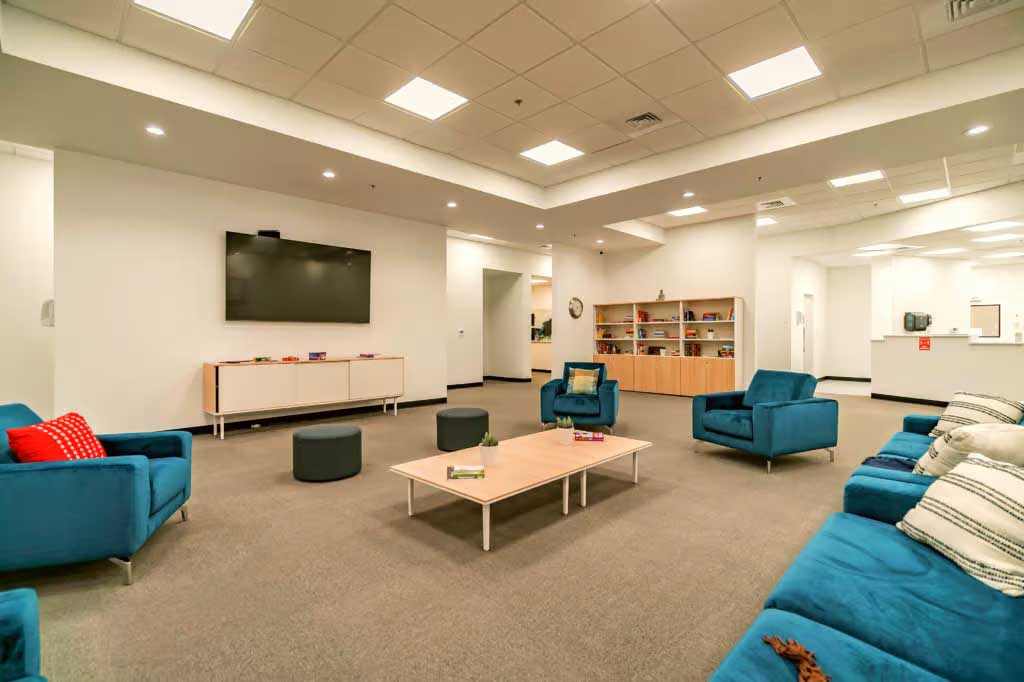Partial Hospitalization Programs or PHP services are programs that provide a balance between inpatient and outpatient care. In this time, recovering users live in a sober living house while attending addiction programming during the day, five days a week. Freedoms during this time are limited.
Partial Hospitalization services for adolescents and adults, this level of care typically provides 20 or more hours of service a week for multidimensional instability that does not require 24-hour care. [1]
Adolescents with more severe substance use disorders but who can still be safely managed in their home living environment; may be referred to a higher level of care, which is the PHP or “day treatment.” [2]
In many cases, patients who already completed a full medical detox transition into partial hospitalization treatment. So when patients no longer require constant supervision, day treatment provides a form of step-down therapy that still provides a high level of medical support.


Get Your Life Back
Find Hope & Recovery. Get Safe Comfortable Detox, Addiction Rehab & Mental Health Dual Diagnosis High-Quality Care at the We Level Up Treatment Centers Network.
Hotline (877) 378-4154Partial Hospitalization Process
In partial hospitalization for addiction treatment, you’ll participate in comprehensive recovery therapy. Physicians, addiction specialists, nurses, social workers, and therapists will work with you to deliver ongoing treatment. Further, depending on the program, services may include:
- Supervised detoxification and ongoing management of withdrawal symptoms
- Medication-assisted therapy to combat the physical signs of substance abuse
- Individualized behavior therapy to help you develop healthy habits
- Group counseling on relapse prevention, healthy coping mechanisms, team building, family education, and stress management
- Holistic therapies, including yoga therapy, fitness classes, music therapy, art therapy, and meditation training
- Aftercare planning for support groups, 12-step programs, counseling therapy, and sober living
Also, many partial hospitalizations for addiction treatment programs include dual diagnosis treatment. This form of therapy may be necessary for people who have co-occurring substance abuse and mental health disorders. Because mental health problems and substance abuse disorders often play off each other, treating both conditions simultaneously offers sufferers the best chance at long-term success.
Get Help. Get Better. Get Your Life Back.
Searching for Accredited Drug & Alcohol Rehab Centers Near You? Or Mental Health Support?
Even if you have failed previously, relapsed, or are in a difficult crisis, we stand ready to support you. Our trusted behavioral health specialists will not give up on you. Call us when you feel ready or want someone to speak to about therapy alternatives to change your life. Even if we cannot assist you, we will lead you wherever you can get support. There is no obligation. Call our hotline today.
FREE Addiction Hotline – Call 24/7Dual Diagnosis Cases
Although substance use disorders commonly occur with other mental illnesses, this does not mean that one caused the other, even if one appeared first. Establishing which came first or why can be difficult. However, research suggests three possibilities for this common co-occurrence:
- First, common risk factors can contribute to both mental illness and substance use disorders. Second, research indicates that many genes can contribute to the risk of developing both a substance use disorder and a mental illness. For example, some people have a specific gene that can increase mental illness risk as an adult if they frequently used marijuana as a child. Third, a gene can also influence how a person responds to a drug – whether or not using the drug makes them feel good. Finally, environmental factors, such as stress or trauma. These can cause genetic changes passed down through generations and may contribute to the development of mental illnesses or a substance use disorder.
- Mental illnesses can contribute to drug use and substance use disorders. Some mental health conditions have been identified as risk factors for developing a substance use disorder. For example, some research suggests that people with mental illness may use drugs or alcohol as a form of self-medication. Although some drugs may help with mental illness symptoms, sometimes this can also make the symptoms worse. Additionally, when a person develops a mental illness, brain changes may enhance the rewarding effects of substances, predisposing the person to continue using the substance. Thus, substance use and addiction can contribute to the development of mental illness.
- Substance use may change the brain to make a person more likely to develop a mental illness. Additionally, these addictive substances can deplete the chemicals in our brain.
First-class Facilities & Amenities
World-class High-Quality Addiction & Mental Health Rehabilitation Treatment
Rehab Centers TourRenowned Addiction Centers. Serene Private Facilities. Inpatient rehab programs vary.
Addiction Helpline (877) 378-4154Proven recovery success experience, backed by a Team w/ History of:
15+
Years of Unified Experience
100s
5-Star Reviews Across Our Centers
10K
Recovery Success Stories Across Our Network
- Low Patient to Therapist Ratio
- Onsite Medical Detox Center
- Comprehensive Dual-Diagnosis Treatment
- Complimentary Family & Alumni Programs
- Coaching, Recovery & Personal Development Events
Partial Hospitalization Program
PHP Services are not a substitute for inpatient care.
For some patients, the availability of partial hospitalization may shorten the length of stay of the entire hospitalization or serve as a transition from inpatient to outpatient care. It may allow some patients to avoid hospitalization. Placement in a partial hospital program is a clinical decision that can be made only by a physician. By a treatment professional thoroughly knowledgeable about the patient’s illness, history, environment, and support system. [3]
In other cases, a person may be admitted to a PHP because they have relapses in their drug use, and more intensive services are needed to re-stabilize the person. [4]
World-class, Accredited, 5-Star Reviewed, Effective Addiction & Mental Health Programs. Complete Behavioral Health Inpatient Rehab, Detox plus Co-occuring Disorders Therapy.
CALL (877) 378-4154End the Addiction Pain. End the Emotional Rollercoaster. Get Your Life Back. Start Drug, Alcohol & Dual Diagnosis Mental Health Treatment Now. Get Free No-obligation Guidance by Substance Abuse Specialists Who Understand Addiction & Mental Health Recovery & Know How to Help.
We Level Up New Jersey PHP Services
A critical element of recovery success in treating not only substance abuse but its co-occurring disorders. Basically, these are the underlying correlated mental health triggers for addiction. We create a treatment plan that addresses physical aspects of withdrawal & medical detox and the psychological connection to substance abuse and underlying mental health issues. Treating the entirety of all co-occurring illnesses is a crucial part of setting clients up for recovery success. Therefore, We Level Up NJ Treatment Center also provides stand-alone secondary co-occurring behavioral health treatment.
For those suffering from addiction, We Level Up New Jersey is here. As a licensed and accredited rehabilitation center, we are dedicated to helping you meet your goals, one day at a time.
Additionally, in an effort to help you find and maintain sobriety, we favor a personalized approach to care. From the moment you begin with us, our counselors will help you find a path that fits with your background, your substance(s) of choice, your lifestyle, your interests, and your unique needs.
To best customize our services to your needs, our programming includes:
- Family Therapy
- Individual Therapy
- Humanistic Therapy
- Group Addiction Therapy
- Cognitive Behavioral Therapy
- Mindfulness Training for Stress Reduction
We Level Up Addiction Treatment Center offer Addiction Rehab residential inpatient, PHP services, outpatient, and recovery programs. Proven recovery success experience, backed by a Team w/ History of:
- 10K+ Recovery Success Stories
- 15+ Years Treatment Success
- Low Patient to Therapist Ratio
- 100s of Verified 5-Star Reviews
- Dual Diagnosis Mental Health Treatment

We Level Up NJ Treatment Center addiction, and mental health hotline counselors are ready 24 hours, 7 days a week. Definitely, we are ready to help with any questions you have about alcohol, drug addiction, detox rehab, and behavioral health treatment. To emphasize there’s never any obligation, and we’ll give you or your loved one the critical answers you deserve to get on the road to real recovery.
Experience Transformative Recovery at the We Level Up Treatment Center.
See our authentic success stories. Get inspired. Get the help you deserve.



Start a New Life
Begin with a free call to an addiction & behavioral health treatment advisor. Learn more about our dual-diagnosis programs. The We Level Up treatment center network delivers various recovery programs at each treatment facility. Call to learn more.
- Personalized Care
- Caring Accountable Staff
- World-class Amenities
- Licensed & Accredited
- Renowned w/ 5-Star Reviews
We’ll Call You
Sources:
[1] Levels of Care – American Society of Addiction Medicine
[2] Treatment Settings – National Institute on Drug Abuse
[3] Definition of Partial Hospitalization – National Library of Medicine
[4] Center for Substance Abuse Treatment and Research – The Johns Hopkins University